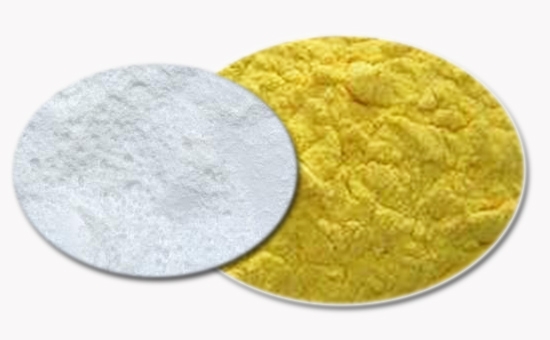
Vulcanizing agent can vulcanize the rubber under specific conditions. After vulcanization, the linear molecular structure changes into three-dimensional network structure, and the physical and mechanical properties of the rubber are significantly improved. In actual production, there are many products that can be used as curing agent, sulfur is the most common curing agent. When using reclaimed rubber to produce rubber products, different uses of reclaimed rubber products have different requirements for physical properties. Rubber products manufacturers need to select appropriate vulcanizing agents, and can use different kinds of vulcanizing agents together if necessary.
1. Sulfur
In the production process of reclaimed rubber products, the compound cured with sulfur has high mechanical strength, good fatigue resistance, dynamic and static properties, but poor heat and oxygen aging resistance. Sulfur powder, precipitated sulfur, limb sulfur 2ylyy115 and insoluble sulfur are commonly used rubber vulcanizing agents. Ordinary sulfur powder and insoluble sulfur are more common in reclaimed rubber products. The solubility of sulfur in different kinds of reclaimed rubber is different. Too much sulfur will cause problems such as excessive sulfur and frost spray, which will affect the mechanical strength and adhesion properties of products. In practical production, it is not easy for insoluble sulfur to scorch and spray sulfur during vulcanization.
2. Sulfur compounds
Sulfur compounds can release active sulfur or sulfur-containing free radicals at vulcanization temperature to vulcanize rubber. At present, the common sulfur compounds in rubber products industry include sulfur monoxide, sulfur dioxide, thiuram disulfide, dimorphine disulfide, diethyl thiophosphoryl, dimorphine tetrasulfide, alkylphenol disulfide, alkylphenol disulfide, aliphatic polysulfide, etc. It should be noted that the sulfurization of sulfur-containing compounds occurs only when the temperature rises to the point where the sulfide containing compounds decompose into active sulfur.
In the production of reclaimed rubber products, sulfur compounds can be used alone or together with sulfur, and the vulcanizate has better heat resistance, elasticity and compression set resistance.
3. Organic peroxide
The mechanical strength of reclaimed rubber vulcanized with organic peroxide is lower, but the heat resistance and compression set resistance are better. In actual production, benzoyl peroxide, diisopropyl peroxide, di tert butyl peroxide and tert butyl isopropyl peroxide are commonly used rubber vulcanizing agents, especially diisopropyl peroxide (DCP). It should be noted that the peroxide vulcanizate will have a certain odor, so the odorless reclaimed rubber products should be used carefully.
In actual production, DCP is particularly sensitive to acidic substances, so it is not suitable to use rubber additives with acidic surface such as trough carbon black and silica in reclaimed rubber vulcanized with DCP.
4. Metal oxides
Rubber products with chloroprene rubber as the main raw material can be vulcanized with metal oxides, such as zinc oxide, magnesium oxide, lead oxide, lead tetroxide, etc. When using reclaimed rubber to produce rubber products, metal oxides are generally not used as the main curing agent.
5. Resin curing agent
The rubber vulcanizate cured with resin has excellent heat resistance and flexure resistance, and no reversion occurs during vulcanization. In actual production, p-tert-butyl phenol formaldehyde resin, alkyl phenol formaldehyde resin, tert octyl phenol formaldehyde resin, bromomethyl alkyl phenol formaldehyde resin, sulfur-containing alkyl phenol formaldehyde resin can be used as rubber curing agent. In theory, nitrile rubber, butyl rubber and EPDM rubber can be cured by resin.
At present, sulfur powder, insoluble sulfur, diisopropyl peroxide, thiuram disulfide, phenolic resin and so on are widely used in the production of reclaimed rubber products. Quinone vulcanization is also used in the rubber products industry. Because it is not common in the production of reclaimed rubber products, it will not be described in detail.
Exclusive original article [commercial authorization] reprint, excerpt and excerpt in any form are prohibited without written authorization. Focus on Hongyun rubber: learn the process formula and raw material technology of producing rubber products from recycled rubber to help you reduce costs and increase profits